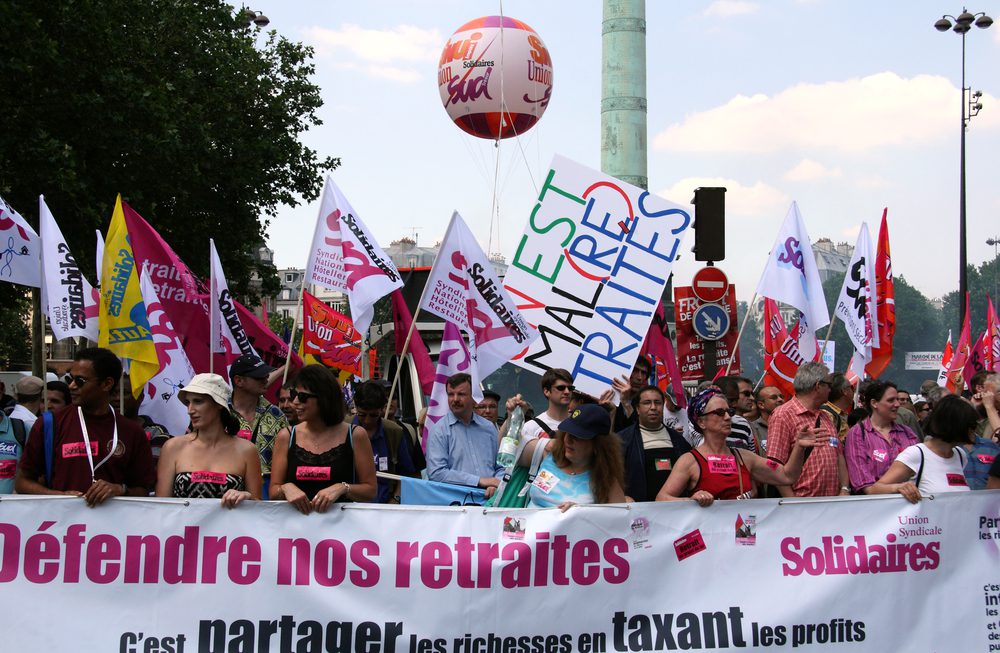
After a relatively calm political summer, Emmanuel Macron is increasing the pressure on the deputies of the National Assembly as he prepares to bring up the thorny issue of pension reform. Unsure of obtaining a public consensus and a parliamentary majority on this reform, he is threatening to force his way through: an arm-wrestling logic that he is taking on without qualms, and which may lead to the dissolution of the Assembly.
Across the EU, the news is currently dominated by the Russian-Ukrainian conflict and the related energy crisis. However, despite the urgency of these issues, Emmanuel Macron is keen to move forward on an issue that has been pending since his previous term and is highly unpopular: pension reform. In particular, he wants to push back the retirement age from 64 to 65. The project is violently opposed by the public, both on the Left and in the ranks of the Rassemblement National, and has already led to several phases of violent strikes in 2019. Since the legislative elections of June 2022, Emmanuel Macron’s party, Renaissance (ex-LREM), has only a relative majority in the National Assembly. It must therefore negotiate with the other political forces represented if it hopes to pass the law. Opposition is categorically assumed on the side of the left-wing coalition of the NUPES (Nouvelle Union Populaire, Écologique et Sociale) and the RN; on the side of Les Républicains, the line is not clear, and the deputies oscillate between awareness of the need to move forward on the reform and refusal to serve as an auxiliary force to the government party.
Prime Minister Elisabeth Borne has already warned the public that if the law fails in the Assembly, the government could resort to Article 49.3 of the constitution, which allows executive power to force a law through in the event of a blockage on the legislative level. Article 49.3 has a very bad reputation in France and is accused of embodying the authoritarian drift of a government incapable of social and political dialogue. Its use in the first year of Emmanuel Macron’s second term would certainly be very badly perceived by the French. Yaël Braun-Pivet, President of the National Assembly, is well aware of this. She explained to BFM TV that the use of 49.3 would be “a collective failure.”
The reply was not long in coming: if the government uses ‘49.3,’ the NUPES as well as the RN announced that they will resort to the motion of censure against the government. This device has rarely been used under the Fifth Republic, whose constitution was designed to allow the stability of the executive. The motion of censure allows the government to be overthrown by a vote of the deputies—a procedure with which the Italians, for example, are familiar, but which has virtually disappeared from the French political landscape since the end of the Fourth Republic in 1958. The device has only worked once, in 1962, against Georges Pompidou, during the debate on the introduction of the election of the President of the Republic by universal suffrage. To be valid, the motion of censure must receive 289 votes—a possibility, although largely improbable if the forces of opposition to Emmanuel Macron manage to reach an agreement: the total votes of the NUPES, the RN, and Les Républicains amount to 281 deputies, to which can be added about 30 independent deputies both on the Right and Left.
The legislative and executive powers are now engaged in a form of institutional one-upmanship. Emmanuel Macron responded to rumours of a motion of censure with another rumour: that of a dissolution of the National Assembly, which would lead to the organisation of new elections. He wants to appear as a courageous president who is determined to go through with his reforms.
It is above all a battle of images. As Benjamin Morel, a specialist in public law, explains in an interview with Le Figaro, Emmanuel Macron has no interest in a dissolution in the current context of crisis and inflation, because new elections could be unfavourable to him. He runs the risk of seeing his opponents strengthen on the occasion of a new election—and particularly his opponents on the right, LR and RN, as the NUPES currently possess a degraded image in public opinion.
If they remain very uncertain for the moment, the hypotheses of motions of censure and dissolution that agitate party headquarters—and the press—testify to extreme tension in the larger French political debate.
